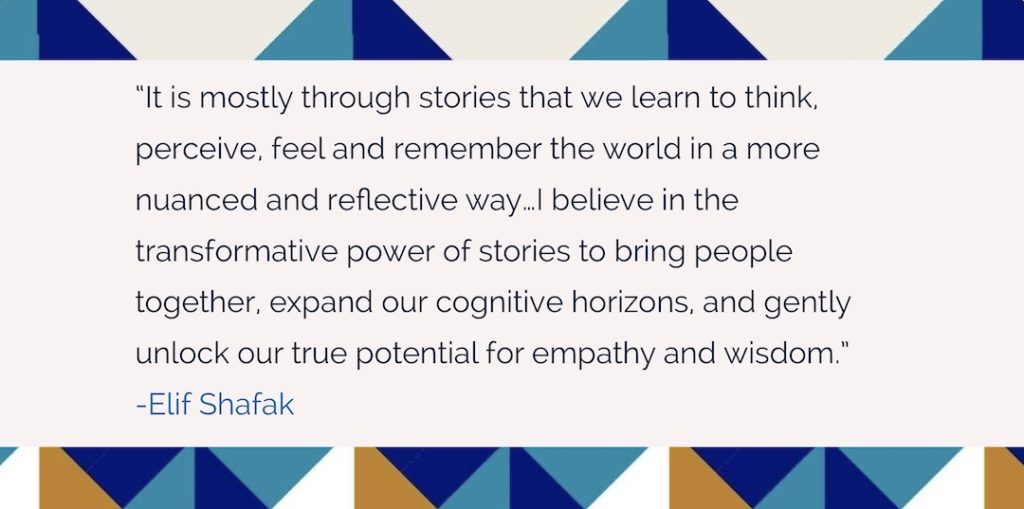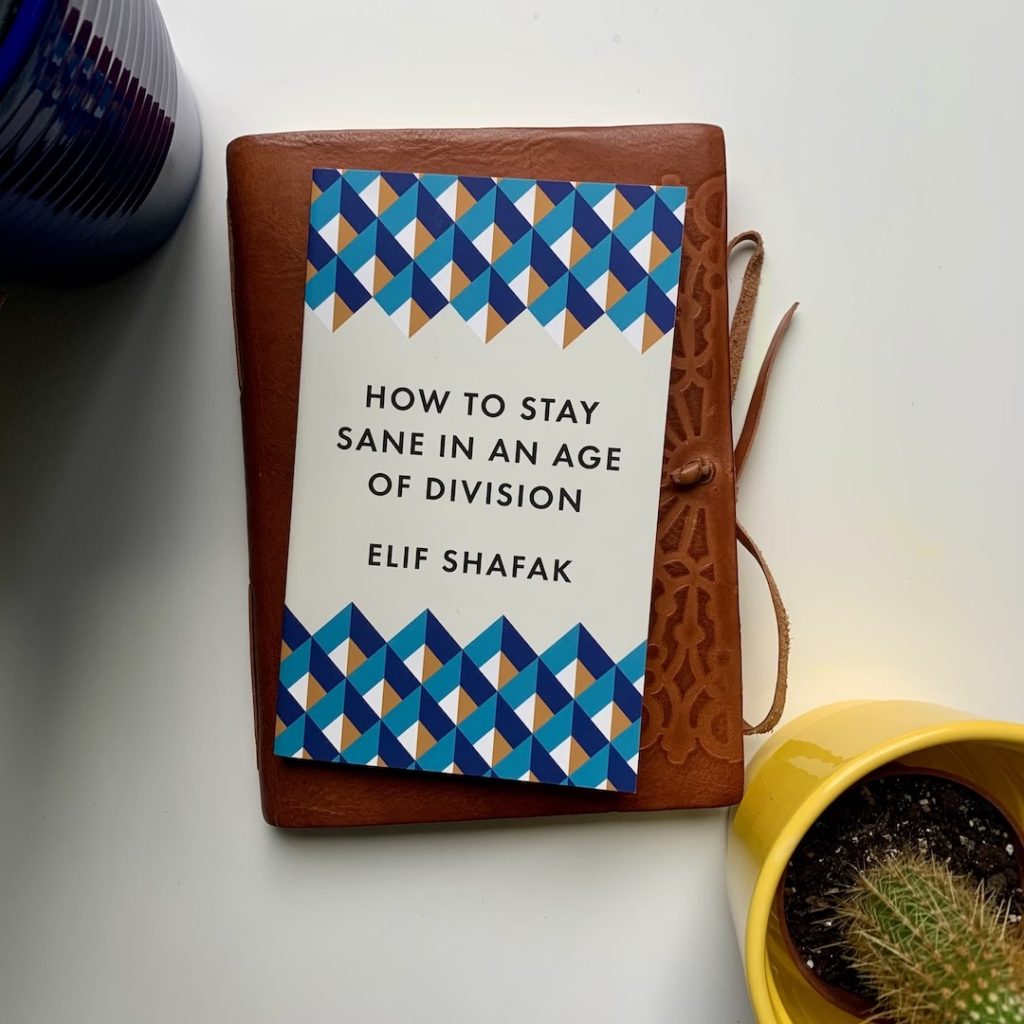After ten years, I have finally finished paying off my student loans from my bachelor’s degree! I had initially wanted to write a post comparing the German and US education systems. Rather than writing a methodical pro and con list, I recently read Elif Shafak’s powerful little book How to Stay Sane in an Age of Division, and many of her observations resonated with my university experiences. Schools and universities are a kind of microcosm of society—you can tell a lot about a community by looking at the education system. How to Stay Sane in an Age of Division contains a series of philosophical observations and provides a great framework to consider how we approach one another in each of our different contexts.
Initially, Elif Shafak analyses the contemporary human condition in light of the current COVID-19 pandemic. The book reads like a long essay as Shafak considers how the pandemic has exacerbated the brewing divisions already present in our communities and how we can use this moment to reflect and hopefully soften some of our harder edges. It’s subtle, personal, and above all else, hopeful.
Shafak first considers the components that lead to ‘disillusionment’ and ‘bewilderment’ in a fragmented society. Through groupthink and social media, echo chambers are created, resulting in people increasingly listening less to one another and no one feeling understood:
“The feeling of being systematically unheard will slowly, gradually, seal our ears, and then seal our hearts. In retracting our willingness to listen to others, we ensure that they, too, feel unheard.”
This feeling leads to individuals prioritizing their own values and by extension, their group’s, which Shafak calls ‘group narcissism.’ This clear partitioning of society members leads each faction to place the other’s complex ideas, histories and hopes into an oversimplified box: “By placing us into boxes they are denying us our own truth. By placing others into boxes, we are denying them their own truth. And so it goes.”
One of the primary reasons I opted to study in Germany (other than the clear price tag differences) was because of the heightened othering I experienced in the US university system. While working at The University of Vermont, I began taking night classes towards a master’s degree. I had the opportunity to interact with some of the full-time master’s students and quickly observed divisions amongst them. In a modern novel class, one student cried and screamed at another because they disagreed with their take on a fictional character. By the end of the semester, only a few students dominated the discussion, talking past one another. A sign of Shafak’s contention— “nuanced debate is not welcome any more” —could have been hung on the classroom door.
Instead, Shafak contends we should use these moments of difference to recognize one another’s complexities and learn from them. In doing so, we break down barriers between groups that have been constructed through oversimplification and repetition and build more complex definitions of belonging. She explains:
“In life most of what we have come to understand throughout the years we have acquired by interacting with dissimilar, and often challenging views, and by encountering information, criticism and knowledge hitherto unfamiliar to us, and then processing these internally by growing insight from seeds of discussions, readings and observations.”
Within the confines of college campuses, this is what we hope to achieve; learning through difference to become more complex individuals. With people from a variety of backgrounds living in such a small space, university life acts as a kind of pressure cooker for the larger community and world.
While studying in Germany, I had the opportunity to engage with an international cohort that challenged my perception of the world and therefore, my identity and values. Students still argued in class, but this time over issues like food security and human rights, and afterward, people remained friends and took the discussion outside of the lecture. My language even changed. A childhood friend, who is now an English teacher, came to visit and pointed out that I was using certain tenses more often, which are more common amongst second-language speakers. I love how in flux our sense of belonging and even language can be if we’re open to it— we’re “always becoming, never being.”
Although living in different places facilitates diverse interactions, Shafak contends it is ultimately about being open to the diverse views that are already around us. If we see people as complex beings, we are more likely to listen and less likely to put others into boxes:
“Multiple belongings are nurtured by cultural encounters, but they are not only the preserve of people who travel. It is an attitude, a way of thinking, rather than the number of stamps on your passport. It is about thinking of yourself, and your fellow human beings, in more fluid terms than solid categories.”
The idea of ‘multiple belongings’ is as relevant to strangers we meet while traveling as to our childhood neighbors. Everyone has a story to tell and is worthy of being heard.
The first Christmas I spent in Germany, three friends and I tried to go to a Christmas Eve service at the Berliner Dom. On the way there, we discussed religion; two friends from Pakistan identified as Muslim, me as Christian, and a friend from China simply stated that she believes in hope. While standing in line to get into the Dom, a couple of women from the local mosque were handing out cookies with a note in several languages that said, “We believe in Jesus too. Merry Christmas!” We didn’t end up getting into the church, but we spent the rest of the night talking over hot chocolate. Things have changed a lot since then, but that shared evening where all our paths crossed and we got to swap stories, for me, is what life is all about.

STATS
Title: How to Stay Sane in an Age of Division
Author: Elif Shafak
Publication Year: 2020
Pages: 90


Do you think universities are presently providing that “pressure cooker” of mixed backgrounds for open discussion and human growth to flourish?
Your experience in Germany displayed conversation could be held, but your example of the students in the University of Vermont has to leave you at least mildly conflicted. It is interesting that conversation was more successful with a more diverse group, where divides and lines can be more easily seen. This is assuming the University of Vermont had a less diverse group?
Why do you think there was a stark contrast between the two?
Thank you for your thoughtful feedback, Grayson! On the whole, I would say universities are not providing that much needed “pressure cooker,” particularly in the US, but also, students generally don’t seem to want one.
The biggest difference between both systems, I feel, is the US student body act more like consumers, while students in Germany appear more invested in the intellectual pursuit of a degree. In many ways, I understand the consumerist mindset in the US – we work and pay a lot to attend university. But that mindset seems to create entitled students, who are more interested in validating their own perspectives (and increasingly feelings) rather than learning and engaging in meaningful discussion. Although the UVM students weren’t as diverse as my German program cohort, I think this mindset is ultimately what kills meaningful discussion.
On the flip side, students in Germany seem more ready to learn and engage in discussions with their peers. To contrast my UVM experience with one in Germany as an example – two students from non-secular states discussed the enforcement of religious dress codes (the one student wearing a hijab), and both were able to remain civil and hear one another out. I can’t imagine such a debate leading to a constructive conversation in a US university.
Happy to keep this discussion going and looking forward to hearing your take.
Well said. With this dilemma we face, what do you think is a solution?
Or, if a solution is not found, where do you foresee effective discussion of ideas and differences moving to?
That’s a great question – In general, I think many of these communication issues are partially a result of a larger ‘chip on one’s shoulder’ culture. Education-wise, I think we need to move away from bachelor’s degrees being the new standard. We could diversify higher education and prioritize college as a means to get a job and not high school 2.0. Some BA programs could be reintroduced to trade schools, ideally making higher education more affordable over the long term. By removing some of the pageantry and padding surrounding universities and getting back to brass tacks, hopefully we’ll also deflate our egos and the price tag.
As Shafak says in her book:
“We live in an age in which there is too much information, less knowledge and even less wisdom. That ration needs to be reversed. We definitely need less information, more knowledge, and much more wisdom.”